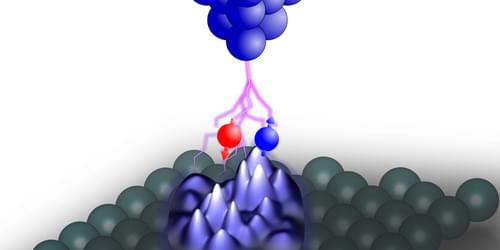A single molecule provides a controllable connection between a normal metal and a superconductor.
Researchers have caused a material’s superconductivity to permeate into a nearby normal metal via a single molecule [1]. They showed that this effect could be controlled and say that this control could allow the creation of so-called Majorana quasiparticles, which many research teams are exploring as future quantum bits (qubits) for quantum computers.
The spread of superconductivity into a normal metal in contact with a superconductor has been studied for decades. These experiments are typically done with thin films of the materials. However, the microscopic mechanism underpinning the effect—a normal-to-super-current conversion known as Andreev reflection—can be hard to control, and control is essential for applications of the effect.
